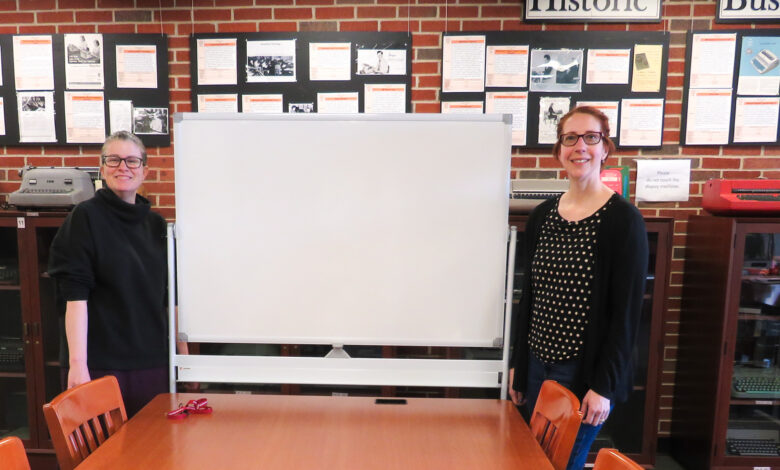
Library staff looks for silver lining amid cuts
By Hannah Newman
Moore Library had a budget of $1.25 million when Sharon Whitfield, an associate professor-librarian, started working at Rider in 2019.
That figure has now been slashed in half.
In 2020, budget cuts befell the university during the pandemic, the library facing its largest one in that time frame, according to Whitfield. Now, the staff is looking for ways to reconstruct leadership, services and resources on a smaller allowance.
Alongside the cuts, employment inconsistencies have intensified the challenges of Moore Library’s operations as remaining workers have continued without a dean since October.
“We really had to prepare for how we can change our services and reframe them in order to still meet the informational needs here at Rider,” said Whitfield. “It [budget cuts] was a real pivot for us.”
A breaking budget
The budget was cut 20% in 2021, with $100,000 worth of journals, over $60,000 in standing orders and canceled databases with a high cost per view gone as a resource for students, according to an email to The Rider News from Melissa Hofmann, an assistant professor-librarian, which also stated that the budget was cut 30%, or about $300,00 in 2022.
It has since been cut an additional 20%.
“We moved from what we call a ‘just-in-case model’ to a ‘just-in-time model,’ and that means we would no longer hold onto journals simply to hold onto them, but to really be more cognizant of how and what is getting used,” said Whitfield. “A lot more data analysis came into play.”
She said the strategy in determining what sources are worth keeping or not lies within a system based on the cost of library loans.
“We really look at our resources almost with a threshold of a cost per use,” said Whitfield. “We look at a $30 threshold and we use the $30 because literalists have said that it’s about how much it would be to do an interlibrary loan.”
Changing deans
The cuts have been alongside a constant change of leadership, with the Interim Dean of Libraries Jason Barr leaving in September for a job at Columbia University. Alongside his role in the library, he was also the dean of the College of Education and Human Services.
“We’ve adapted to a lot of ‘bottom-up’ leadership, just working together to see how we can prioritize in all of our areas of expertise,” said Whitfield. “It comes with a lot of setbacks like communication barriers. Without having a dean to communicate what we’re doing to the entire university comes with communication gaps with our services.”
With Barr gone, DonnaJean Fredeen, the university’s provost, has taken over. Fredeen noted that there will not be a dedicated dean for the library in the near future.
Hofmann expressed that without specified leadership in library work, an immense pressure has been put on the shrinking staff in terms of making effective decisions for operations.
“If we don’t have leadership that has some semblance of library work and can drive priorities forward, it becomes difficult, because we’ve been leaning from the bottom up, which isn’t always most effective,” said Whitfield.
In addition, Rider’s archivist, Robert Congleton, retired in June 2023. The position will not be filled, according to Hofmann.
She also mentioned that the library has lost six librarians and nine staff members in different fields of expertise, bringing the remaining faculty to run on “bare bone.”
Although there have been roadblocks without formal leadership, Whitfield mentioned that the staff has managed to work well on improving the library, specifically student spaces.
“We wanted to rethink what the library actually meant on campus,” said Whitfield.
The library has been working toward getting grants. Recently, it received a virtual reality grant that has given it the chance to work with classes in the Norm Brodsky College of Business.
Educational resources have grown, too, as textbooks for some courses can be found within the library, relieving some of the financial burden of textbook purchases.
Facilities has assisted with cleaning out the periodical room in hopes to make more space on the library’s floor.
Not only have resources improved, but the desire to utilize the library’s spaces has also elevated, as the librarians mentioned advancements made internally with power towers by tables and whiteboards that were added last summer.
“There were a number of years that we were not getting people to come to the library, and now we regularly get between 2,000 to 3,000 people coming to use our library services,” said Whitfield. “In the past nine months, we had over 4,000 study room reservations.”
With a future that does not foresee a dean for library operations, it is in the hands of the campus and staff to dictate what the next steps will be in implementing further improvements.
“We’re going to keep focusing on feedback, but I’m not sure we have alignment between the institutional vision and ours,” said Whitfield.


